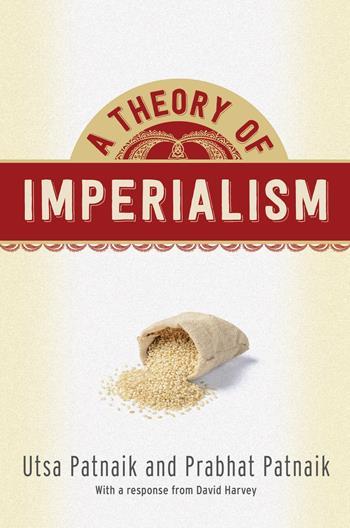A Theory of Imperialism
Columbia University Press
A Theory of Imperialism
Columbia University Press
In A Theory of Imperialism, economists Utsa Patnaik and Prabhat Patnaik present a new theory of the origins and mechanics of capitalism that sounds an alarm about its ongoing viability. Their theory centers on trade between the core economies of the global North and the tropical and subtropical countries of the global South and considers how the Northern demand for commodities (such as agricultural products and oil) from the South has perpetuated and solidified an imperialist relationship. The Patnaiks explore the dynamics of this process and discuss innovations that could allow the economies of the South to achieve greater prosperity without damaging the economies of the North. The result is an original theory of imperialism that brings to light the crippling limitations of neoliberal capitalism.
A Theory of Imperialism also includes a response by David Harvey, who interprets the agrarian system differently and sees other factors affecting trade between the North and the South. Their debate is one of the most provocative exchanges yet over the future of the global economy as resources grow thin, populations explode, and universal prosperity becomes ever more elusive.
A Theory of Imperialism also includes a response by David Harvey, who interprets the agrarian system differently and sees other factors affecting trade between the North and the South. Their debate is one of the most provocative exchanges yet over the future of the global economy as resources grow thin, populations explode, and universal prosperity becomes ever more elusive.
A highly original, powerfully presented, and extremely thought-provoking new theory of imperialism that will force anyone concerned with the question of imperialism to rethink their own presuppositions. Robert Pollin, codirector and professor of economics, Political Economy Research Institute, University of Massachusetts, Amherst
Utsa and Prabhat Patnaik provide us with an important and incisive contribution to the theory of imperialism. Through a rigorous analysis of the policies pursued in India, they demonstrate how the contemporary pattern of imperialism is a continuation of its previous colonial pattern, in which peasant agriculture is systematically undermined, thus generating a gigantic and growing reserve of surplus labour. The ideas outlined in A Theory of Imperialism are central to understanding the construction of the unequal global system in the past and in the present. Samir Amin, author of The Implosion of Capitalism
This is the best book-length treatment on the economic aspects of imperialism to have been published in the past several decades. It is theoretically powerful and empirically scrupulous, and its historical range covers the entire span of imperialism from the colonial period down to the present day Irfan Habib, author of The Agrarian System of Mughal India 1556–1707
Compelling, convincing, and a corrective that is urgent. Jadaliyya
Foreword, by Akeel Bilgrami
Preface
1. Introduction
2. The Threat of Increasing Supply Price
3. Coping with the Threat
4. The Reserve Army of Labour in the Periphery
5. Capitalism, Poverty, and Inequality
6. Further Elaborations and Clarifications
7. Metropolitan Demand on Tropical Landmass: The Empirical Picture
8. The International Monetary System: Some Issues in Political Economy
9. Some Concluding Remarks
A Commentary on A Theory of Imperialism, by David Harvey
A Response to David Harvey's Comments
Notes
References
Index
Preface
1. Introduction
2. The Threat of Increasing Supply Price
3. Coping with the Threat
4. The Reserve Army of Labour in the Periphery
5. Capitalism, Poverty, and Inequality
6. Further Elaborations and Clarifications
7. Metropolitan Demand on Tropical Landmass: The Empirical Picture
8. The International Monetary System: Some Issues in Political Economy
9. Some Concluding Remarks
A Commentary on A Theory of Imperialism, by David Harvey
A Response to David Harvey's Comments
Notes
References
Index
This book is so welcome today not just for its brilliance and originality, nor just for its depth of insight and its painstaking empirical specifications, but because the discipline of Economics, as it is pursued in departments in universities all over the world, has completely ignored the subject of imperialism for half a century or more. The idea that one can understand the economic conditions of the world without a full comprehension of imperialism, both past and present, comes close to the condition of an intellectual scandal, a lapse that this book definitively redeems.






